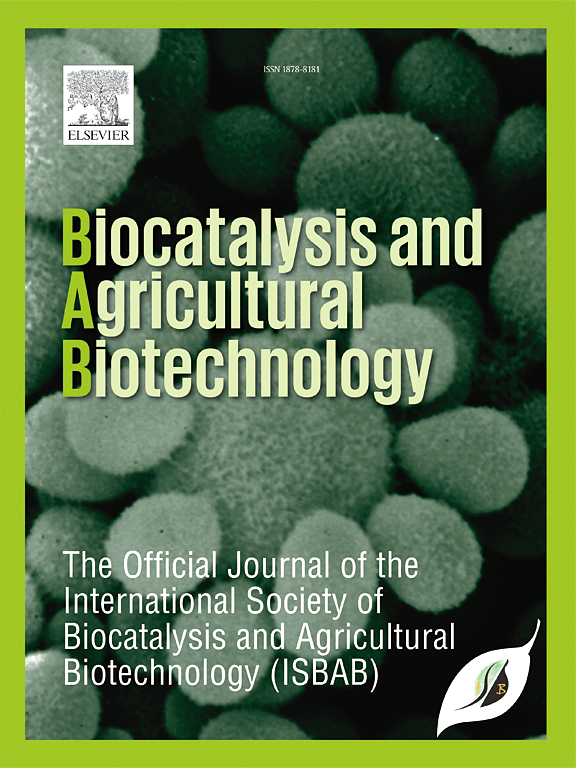Biopriming of Solanum lycopersicum seeds with novel root endophytic bacterial consortium retrieved from halotolerant Sundarban mangroves to sustain growth and yield with salt resilience
IF 3.4
Q2 BIOTECHNOLOGY & APPLIED MICROBIOLOGY
引用次数: 0
Abstract
Mangroves are often found in coastal areas and tropical wetlands that can withstand high salinity. We hypothesized that endophytes that are harbouring in the roots of mangrove plants may improve the innate immunity of host plants to survive naturally in saline environment. Retrieving these endophytes and sequential characterization may function as a novel bio-effector for non-host food crops as well. We focused on the integrated approach towards formulating a novel bacterial consortium. Thirty-one bacterial endophytes isolated from the roots of mangrove plants were screened for plant growth promoting potential by inoculating our model crop (Tomato). Seven most promising isolates impacting plant growth were identified. In-vitro plant growth promoting characters were also analysed. The root colonization by the isolates was confirmed by Scanning Electron Microscopy (SEM). Among the screened isolates, four of them were found to be compatible with each other when grown together and were selected to formulate a novel biostimulant consortia. The consortia treated Tomato plants exhibited superior phenological characters. In the pot experiment, plant height of the treated plants was about ≈43 cm while the non-treated plants under salt stress could grow only up to a height of ≈26 cm. Similarly, a total fruit yield of ≈6.8 kg was observed in case of treated plants under salt stress whereas the non-treated plants under salt stress could only produce ≈4.7 kg of fruit. This study demonstrated that the beneficial bacteria inhabiting in mangrove roots can increase the potential of conferring salt tolerance to non-host crops, thereby contributing to sustainable agriculture.
用从耐盐巽他红树林中提取的新型根内生细菌群对茄科植物种子进行生物修复,以维持其生长和产量,提高抗盐能力
红树林通常生长在能承受高盐度的沿海地区和热带湿地。我们假设,红树植物根部的内生菌可以提高寄主植物的先天免疫力,使其在盐碱环境中自然生存。检索这些内生菌并对其进行连续鉴定,也可作为一种新型生物效应剂用于非寄主粮食作物。我们的重点是采用综合方法组建新型细菌联合体。通过接种我们的模式作物(番茄),筛选了从红树植物根部分离出来的 31 种细菌内生体,以确定其促进植物生长的潜力。最终确定了七种最有希望影响植物生长的分离菌。同时还分析了体外植物生长促进特性。通过扫描电子显微镜(SEM)确认了分离物的根部定殖。在筛选出的分离物中,发现其中四种在一起生长时相互兼容,因此被选为新型生物刺激剂联合体。经联合体处理过的番茄植株表现出优异的物候特征。在盆栽实验中,经处理的植株高度约为≈43 厘米,而在盐胁迫下未经处理的植株只能长到≈26 厘米。同样,在盐胁迫下,经处理的植株果实总产量≈6.8 千克,而在盐胁迫下未经处理的植株只能生产≈4.7 千克果实。这项研究表明,栖息在红树林根部的有益细菌可以提高非寄主作物的耐盐潜力,从而为可持续农业做出贡献。
本文章由计算机程序翻译,如有差异,请以英文原文为准。
求助全文
约1分钟内获得全文
求助全文
来源期刊

Biocatalysis and agricultural biotechnology
Agricultural and Biological Sciences-Agronomy and Crop Science
CiteScore
7.70
自引率
2.50%
发文量
308
审稿时长
48 days
期刊介绍:
Biocatalysis and Agricultural Biotechnology is the official journal of the International Society of Biocatalysis and Agricultural Biotechnology (ISBAB). The journal publishes high quality articles especially in the science and technology of biocatalysis, bioprocesses, agricultural biotechnology, biomedical biotechnology, and, if appropriate, from other related areas of biotechnology. The journal will publish peer-reviewed basic and applied research papers, authoritative reviews, and feature articles. The scope of the journal encompasses the research, industrial, and commercial aspects of biotechnology, including the areas of: biocatalysis; bioprocesses; food and agriculture; genetic engineering; molecular biology; healthcare and pharmaceuticals; biofuels; genomics; nanotechnology; environment and biodiversity; and bioremediation.
 求助内容:
求助内容: 应助结果提醒方式:
应助结果提醒方式:


